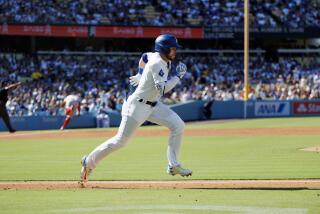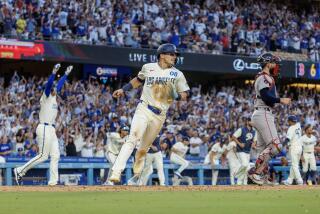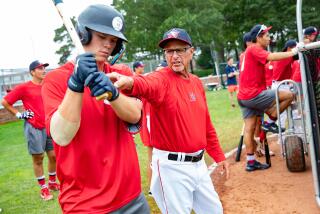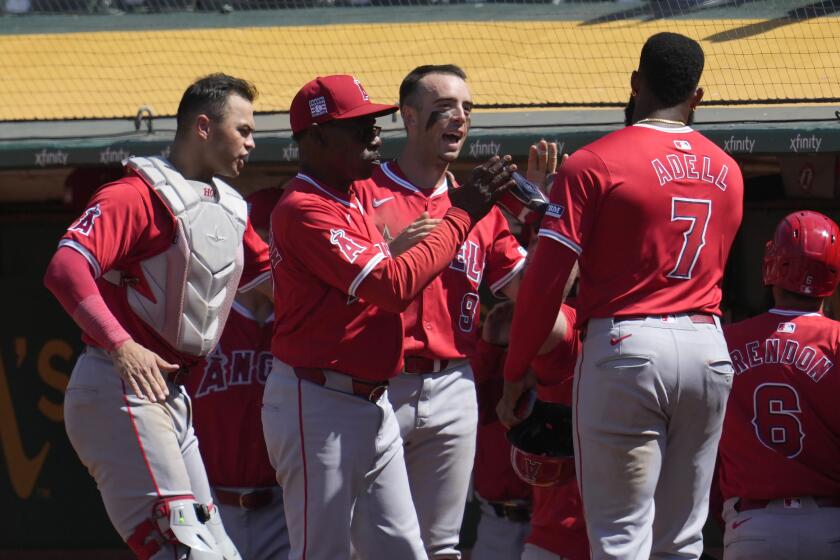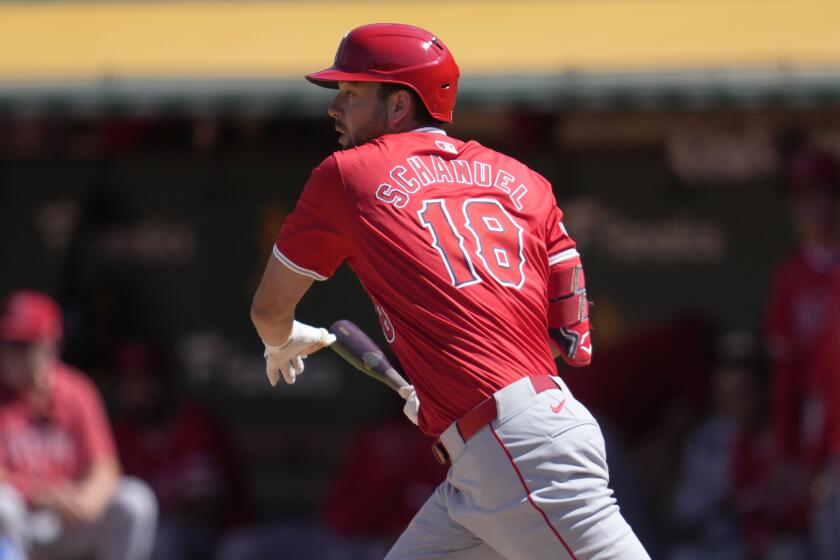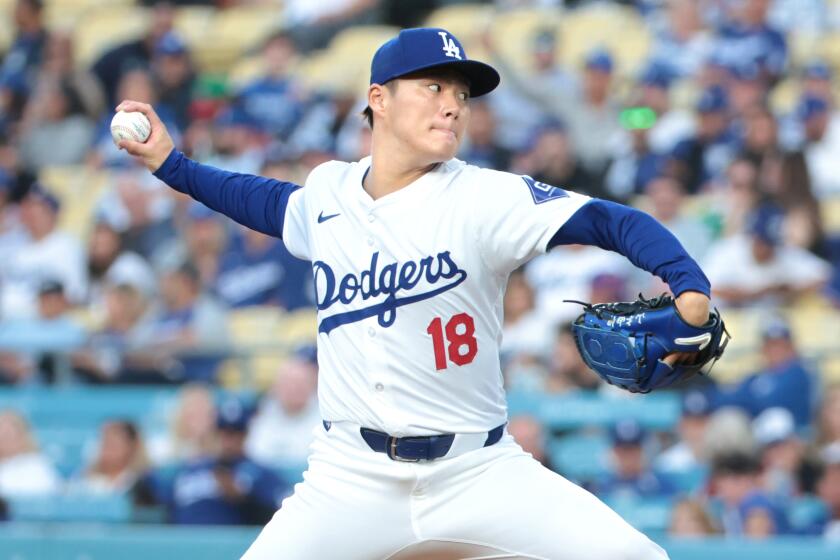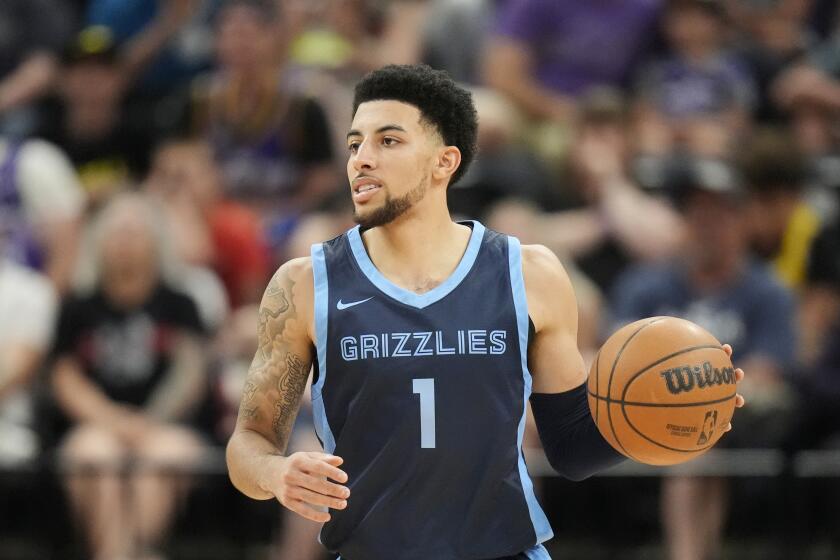Cherokee Parks in the NBA: Let the Packaging Begin : Sports: Before playing a single pro game, the former O.C. high school star planned his marketing empire.
Cherokee Parks stands 6 feet 11 and towers over the TV sports anchor who’s rejecting the Dallas Maverick rookie’s “bribe.”
Parks, a former star at Duke University and at Marina High in Huntington Beach, smiles and offers a Rolex in exchange for getting his basketball highlights on the tube.
No thanks, he is told, no deal.
National TV ads aren’t where you expect to find many NBA rookies--even Michael Jordan had to prove himself as a rookie before becoming a marketing icon.
But the role in ESPN Sports Center’s satirical promotional ad is one of a handful of major endorsements for Parks, who is entering his first season in the marketing-rich National Basketball Assn.
Parks played in his first regular season NBA game Friday night. He has played a total of 11 minutes in his first two games and has scored four points. But he has already laid the groundwork for a unique marketing empire that could earn him millions in the next few years.
“We want to take Cherokee out of the mainstream sports marketing,” said Steve Rotter, president of the New York City advertising firm that markets Parks.
“He’s not just a sweaty guy coming out of the gym. We figure two-thirds of his marketing can be done without a ball in his hand.”
Parks has signed a $3-million contract with the Mavericks and landed a six-figure shoe contract with Nike, which has made a mint promoting stars such as Jordan, Deion Sanders and Ken Griffey Jr.
He rejected an offer from super-agent David Falk, who turned Jordan into a advertising deity, in favor of his own marketing Dream Team:
* Lon Babby, a trial lawyer who defended John Hinckley before becoming a sports agent. Babby helped Detroit’s Grant Hill--Parks’ teammate at Duke--sign several national marketing deals as last season’s co-rookie of the year.
* Rotter’s trendy ad firm, which never had a pro athlete for a client.
* Tristan Simon, Parks’ college buddy who handles his personal affairs and Dallas marketing.
Parks, the 12th player picked in the draft, slam-dunked conventional business wisdom for what he calls an original, hands-on approach.
Not only does it save money--Babby bills him hourly rather than taking a percentage of his earnings--it also keeps him involved in endorsement negotiations rather than turning everything over to an agent.
“It’s something that hasn’t been tried before, a different way of looking at marketing,” Parks said. “The main thing is that I have to get in there and prove myself as a player, break out of my college identity and develop a new one, with a new team.”
Most pro athletes offer a name and face to companies, leaving the corporate types to determine the advertising campaign.
Parks and his staff are developing their own ideas and targeting specific companies and products. A deal with Dallas-area Jeep Cherokee dealers is in the works, as well as a print ad for a beverage.
Parks understands he probably won’t be a marketing success like Hill, who has national deals with Sprite, Schick and General Motors.
“It wasn’t too difficult to market Hill,” Babby said. “But it’s more work with someone like Cherokee. You have to develop an image, locally and nationally.”
Adam Keefe, a first-round pick of the Atlanta Hawks in 1992, never established that image. Keefe, a former star at Irvine’s Woodbridge High and Stanford University, was a role player with Atlanta, and now Utah, and had few marketing opportunities.
Parks will likely fall between the extremes--more marketable than Keefe but not as popular as Hill.
“It’s so speculative right now because Cherokee hasn’t played [professionally] yet,” Peter Land, NBA director of marketing communications, said recently. “You have to remember, he’s on a team with three young, good players in Jason Kidd, Jimmy Jackson and Jamal Mashburn. So the question is: Individually, will it be tough for him to break out on his own?”
There are few marketing opportunities for NBA backup players, even many veteran starters and role players. Most of the money goes to the superstars such as Jordan, Shaquille O’Neal and Charles Barkley.
One NBA marketing source said 90% of the money from this year’s rookie shoe contracts goes to three of the top four picks--Golden State’s Joe Smith, Philadelphia’s Jerry Stackhouse and Washington’s Rasheed Wallace. Parks gets only a fraction of the shoe money, despite being chosen only eight picks lower than Wallace.
“Cherokee could be a great center, but we know he’s not a Shaq or a Hakeem Olajuwon,” Rotter said. “He has strengths they don’t--the all-American boy-next-door type--and that’s what you want to use.”
During four years at Duke, Parks received more national exposure than almost any college player. He appeared on national TV almost 80 times, thanks to Duke’s NCAA championship game appearances in his freshman and junior years.
He averaged 19 points last season for a Duke team that won 13 games and lost 18, but his draft selection was booed by Dallas fans last June.
He was expected to go as high as the eighth pick, but he slipped out of the top 10 when New Jersey and Miami bypassed him to draft forwards Ed O’Bannon and Kurt Thomas.
“I wasn’t in the picture at all, and the Dallas fans had somebody else in mind for who they wanted,” Parks said. “When they took me, a lot of people thought I would be disappointing.”
Parks swayed fans his way with his effort and his attitude.
He averaged an unspectacular seven points and five rebounds while fighting a groin injury during the exhibition season. He finished with 14 points and 11 rebounds Oct. 28 against the Lakers, and he is challenging fellow rookie Loren Meyer for the starting center position.
Fans also have read Parks’ glib sense of humor in his weekly “Rookie Diary” column in a Dallas paper.
And they are learning of his interesting background--his easy-going nature, hippie lifestyle and nomadic childhood, already a legend in Orange County and Durham, N.C.
He arrived at Duke with his mop hair dyed Burgundy. He has a Mayan sun tattoo on his ankle. But Duke Coach Mike Krzyzewski has said people mistakenly perceive Parks as “some sort of California crazy guy.”
“He’s not like that,” Krzyzewski said. “He has a lot of old-fashioned values, and I think he gets that from his mom and his grandparents.”
Raised by his mother, Debe, Parks moved nine times as a child between California and Colorado. Debe was politically active and socially conscious during the early 1970s, so she named her only son after his great grandfather’s Native American tribe.
“Cherokee’s a great story, and he can go very, very far with his image,” said Erin Patton, Nike spokesman. “Not only is he a tremendous athlete and a very intelligent player on the court, but he is a likable person away from it. We think kids can relate to him.”
That’s Nike’s game. Sell the player, sell the shoe. It’s the same game played by the trading card companies, basketball manufacturers and uniform makers: Get players who can get the kids.
The Mavericks’ public relations staff already sees a promising sign--Parks’ new No. 4 jersey (teammate Lorenzo Williams has Parks’ high school and college number, 44) is already a hot-selling item among kids.
Last spring, Parks hired Babby, who defended Hinckley in the trial for shooting then-President Ronald Reagan. Parks was wooed by most of the NBA’s top agents, including Falk, but picked Babby because he liked how he had handled Hill.
Babby negotiated Parks’ three-year, $3.35-million deal with the Mavericks, as well as his three-year Nike contract, which pays him six figures annually.
Parks became the 20th Dallas pro athlete to sign with Nike, joining 12 Cowboys and seven Mavericks. The Dallas market is already dominated by the Cowboys’ Deion Sanders, Troy Aikman and Michael Irvin (Nike), and Emmitt Smith (Reebok), but Parks and his Maverick teammates say there’s plenty of room.
“I think the Cowboys really help our market,” said Kidd, last year’s co-rookie of the year with Hill. “Guys like Deion bring the market to us [Mavericks].
“I think we’re similar to them, except we don’t have two championship rings.”
Parks lost several million dollars in salary because he bypassed the draft after his junior season. The league’s collective bargaining agreement with the NBA player’s union, settled last summer, limits rookie salaries.
Parks’ contract is $5 million less than the one signed by last year’s No. 12 pick by the Miami Heat, guard Khalid Reeves, who was traded Friday to the Charlotte Hornets. Reeves made $1.3 million as a rookie with the Heat, more than Parks will make in any year of his contract.
Still, Parks sees an upside--less money, but more freedom.
He figures the extra year in college improved his outside shooting. He made 31 three-pointers as a senior after attempting only 17 in his previous three years.
Plus, he becomes an unrestricted free agent after the 1997-98 season, and can sign a long-term deal.
“I don’t think coming out after my junior year would have been wise at all,” he said.
“It would have been nice to have that long, guaranteed contract. But with this new contract, there is a little more incentive for a player to improve. If you do that and get off on the right foot, I think it works in your favor.”
A good start also would help his chances at getting endorsements.
His marketing approach is unusual; only a handful of NBA players have experimented with a similar approach, most notably Barkley and Wallace. Wallace, the former North Carolina star, has a sports lawyer, a business lawyer, an investment counselor, an accountant and a personal assistant.
Parks delegates authority and assigns roles, just as a coach would do with assistant coaches. Babby oversees contracts and legal affairs. Simon negotiates Dallas endorsements and schedules local interviews. Rotter’s firm gathers marketing ideas from everyone, then makes the sales pitch.
Parks is the first athlete for Rotter’s firm. The company markets products such as toys and stereo equipment, but took a chance with the Mavericks’ promising rookie.
“We’re having a blast with this,” Rotter said. “We’re treating Cherokee as though he were a product, developing a strategy and positioning him in the market. We’re not looking for a buck here or there with him, but long-term value out of a nice, young kid.”
Simon says Parks’ approach allows him to tailor his ideas to a company’s specific needs.
“Sports marketing is not marketing at all--it’s telemarketing,” he said. “If Cherokee had signed with a big firm, it would call up a corporate decision-maker and say, ‘Hey, I have Cherokee, what would you want to do?’
“Marketing, in a classical definition, is taking an unknown commodity and introducing it to the public. That’s what we are doing with Cherokee.”
Parks brought Simon on board during his senior year at Duke, when agents were trying to contact him. Dealing with agents directly would have been a violation of NCAA rules, so Parks asked Simon to hold them at bay, a job Simon reluctantly took.
When he signed with Babby after the season, Parks invited Simon to join the marketing team. Simon, an English and economics major, scrapped his law school plans and moved to Dallas after the draft.
Some would consider Parks’ approach risky--pro baseball players Steve Kemp and former Angel Don Baylor lost thousands to poor investments and mishandled income in the 1970s and ‘80s.
But Parks insists his hands-on approach--working with the established Babby and the trusted Simon--prevents that.
“This was the best thing for me,” he said. “I wanted to have first-hand knowledge of what’s going on, and this forces me to get involved. I can’t just sit back and let everybody else do the work. I have to get in there and see the big picture.”
Parks’ marketing deal is typical for a highly drafted NBA rookie--a sneaker contract and a handful of local endorsements. But the goal is there for him: Most superstars can reach beyond traditional deals by their second or third year in the league.
“Jordan really took marketing to a new level by going with non-tools of the trade,” Land said. “He went beyond just sneakers and basketballs, and into Gatorade, McDonald’s and cars.”
While Jordan had a built-in image almost from the day he was drafted, Parks has to work harder to develop his--on and off the court.
“There are all kinds of roles you can develop for yourself in this league,” he said. “There’s a guy like [Chicago’s] Jack Haley, the rah-rah type; Dennis Rodman, a rebounder, or Dikembe Mutombo, a shot blocker.
“The main thing is that you have to produce, or nothing else matters.”
(BEGIN TEXT OF INFOBOX / INFOGRAPHIC)
Cashing In
Former Marina High and Duke star Cherokee Parks is one of 14 NBA rookies to sign a shoe contract with Nike. How Parks’ salary and shoe deal stacks up among the top 15 draft picks:
Pick: 1.
Player: Joe Smith
Team: Golden State
Pos.: C
Contract/3 yrs. (in millions): $8
Shoe/national contracts: Nike
****
Pick: 2.
Player: Antonio McDyess
Team: Denver (Clippers)
Pos.: F
Contract/3 yrs. (in millions): $6.36-$7.63
Shoe/national contracts: Nike
****
Pick: 3.
Player: Jerry Stackhouse
Team: Philadelphia
Pos.: G
Contract/3 yrs. (in millions): $5.71-$6.85
Shoe/national contracts: Fila, Schick, Fleer
****
Pick: 4.
Player: Rasheed Wallace
Team: Washington
Pos.: F
Contract/3 yrs. (in millions): $5.15-$6.18
Shoe/national contracts: Negotiating with Nike
****
Pick: 5.
Player: Kevin Garnett
Team: Minnesota
Pos.: F
Contract/3 yrs. (in millions): $4.66-$5.59
Shoe/national contracts: Nike
****
Pick: 6.
Player: Bryant Reeves
Team: Vancouver
Pos.: C
Contract/3 yrs. (in millions): $4.23-$5.08
Shoe/national contracts: Nike
****
Pick: 7.
Player: Damon Stoudamire
Team: Toronto
Pos.: G
Contract/3 yrs. (in millions): $4.6
Shoe/national contracts: Nike
****
Pick: 8.
Player: Shawn Respert
Team: Milwaukee (Portland)
Pos.: G
Contract/3 yrs. (in millions): $3.54-$4.25
Shoe/national contracts: Nike
****
Pick: 9.
Player: Ed O’Bannon
Team: New Jersey
Pos.: F
Contract/3 yrs. (in millions): $3.25-$3.90
Shoe/national contracts: Nike
****
Pick: 10.
Player: Kurt Thomas
Team: Miami
Pos.: F
Contract/3 yrs. (in millions): $3.09-$3.71
Shoe/national contracts: Undecided
****
Pick: 11.
Player: Gary Trent
Team: Milwaukee
Pos.: F
Contract/3 yrs. (in millions): $2.93-$3.52
Shoe/national contracts: Nike
****
Pick: 12.
Player: Cherokee Parks
Team: Dallas
Pos.: F
Contract/3 yrs. (in millions): $3.35
Shoe/national contracts: Nike
****
Pick: 13.
Player: Corliss Williamson
Team: Sacramento
Pos.: F
Contract/3 yrs. (in millions): $2.52-$3.2
Shoe/national contracts: Undecided
****
Pick: 14.
Player: Eric Williams
Team: Boston
Pos.: F
Contract/3 yrs. (in millions): $3
Shoe/national contracts: Nike
****
Pick: 15.
Player: Brent Barry
Team: Clippers (Denver)
Pos.: G
Contract/3 yrs. (in millions): $2.39-$2.87
Shoe/national contracts: Nike
Note: Clippers obtained Barry in trade for McDyess. Respert was drafted by Portland but traded to Milwaukee. Salary range on some contracts based on guidelines set by league’s collective bargaining agreement.
Sources: National Basketball Assn., Nike, Associated Press
Researched by MIKE REILLEY / Los Angeles Times
More to Read
Go beyond the scoreboard
Get the latest on L.A.'s teams in the daily Sports Report newsletter.
You may occasionally receive promotional content from the Los Angeles Times.
